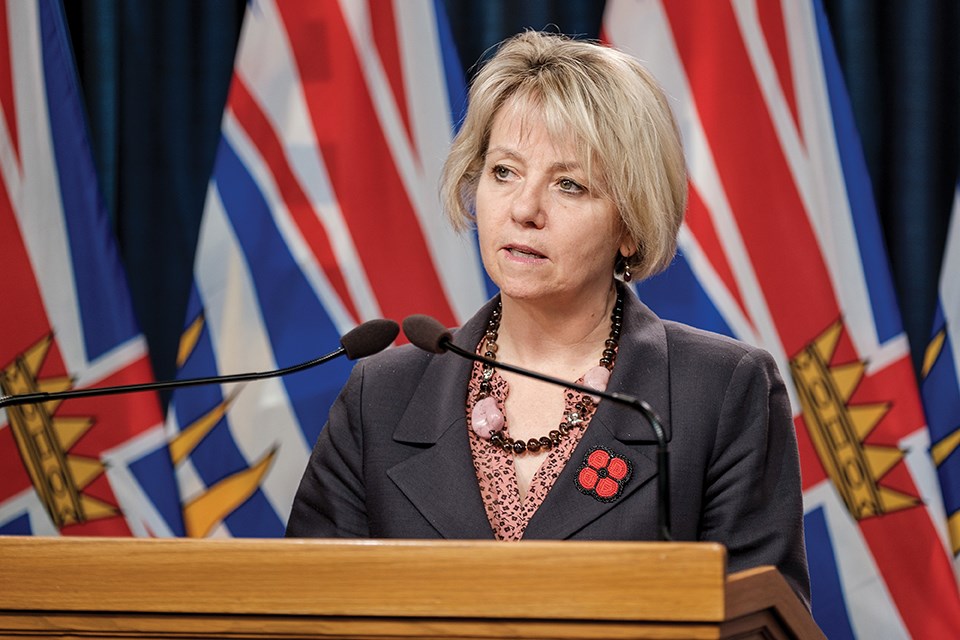B.C. provincial health officer Bonnie Henry issued a series of regional health orders and strong recommendations on Nov. 7 that will be in effect for two weeks as a result of what she called a “worrisome increase of people with serious [COVID-19] illness requiring hospitalization and intensive care.”
Her focus at a rare Saturday news conference was on social gatherings, travel, group physical activities, indoor group activities and workplaces.
The new directives will be in effect in the Vancouver Coastal Health (VCH) and Fraser Health regions, with the exception of the Central Coast and Bella Coola Valley.
Ministry of Health officials told Coast Reporter that the Central Coast and Bella Coola Valley were excluded because they are geographically separated from the rest of the VCH region and “more closely aligned to some of the lower-risk areas in the province,” while Powell River and the Sunshine Coast were included “based on travel [patterns] and health care access.”
“Right now, it is very important that everyone in these areas of Vancouver Coastal and Fraser Health significantly reduce their social interactions,” Henry said Saturday.
“There are to be no social gatherings of any size with anyone other than your immediate household.”
In a statement Sunday, the ministry said the order includes not only gatherings in your home, but also outdoors, at restaurants or at other venues.
Restaurants can remain open but guests must stick to a table with their own household members.
Going for a walk is not considered a social gathering, but British Columbians need to be vigilant that a walk doesn’t turn into a group of people gathering outside.
"I know there has been some confusion on what immediate household means," ministry spokeswoman Shannon Greer said in an email.
"To give some context, these would be the people you spend the most time with and are physically close to. These would be people who are part of your regular routine, so household members, immediate family, a close friend or the people you have regular close contact with (for example a co-parent who lives outside the household)."
Those who live alone cannot host gatherings, but can continue to see members of what they would consider their immediate household at home, outside or at a restaurant, Greer said.
The new orders will be in effect until Nov. 23 at 3 p.m.
Non-essential travel to and from the regions in question, which span the Lower Mainland and Fraser Valley, is strongly discouraged, Henry said Saturday.
Ferry traffic can flow, but passengers are supposed to only be travelling because they need to for an essential reason.
Henry called the directive an “order,” but later also called it a “recommendation in the very strongest terms.”
She said that the new directive is like the one that was in place in the early days of the pandemic, when people were only supposed to be travelling on essential trips.
“Those who live outside the affected areas [the Lower Mainland and Metro Vancouver] should not visit unless it is urgently required, or essential, and travel through only when needed,” she said.
“Travel for sports,” she added, “into and out of this region, is suspended for this period of time.”
Henry said group physical activities have led to a significant spread of COVID-19 – the virus that has caused a global pandemic.
“As of today, businesses, recreation centres or other organizations that organize or operate indoor group physical activities, must stop holding these activities, until updated COVID-19 safety plans are in place so they can be held safely.”
Party buses, she said, are also banned.
When it comes to the workplace, Henry said she wants employers to revert back to having employees work from home as much as possible.
“We need to consider going back to actively supporting people working from home in certain businesses, if that is possible,” she said.
“All businesses and work sites must conduct active in-person screening according to our COVID safety plans for their workers on site now.”
She wants business owners to take another look at their COVID-19 safety plan, and emphasize to staff and customers how important the plans are.
“Workplaces must ensure that all workers and customers maintain appropriate physical distancing, wear masks as appropriate, and be especially vigilant in small-office spaces, in break rooms and kitchens," she said.
This, she said, is where the province has seen people transmit the virus in work settings.
“If we cannot maintain those plans, then local medical health officers will shut those businesses down.”
If restaurants cannot adhere to COVID-19 safety plans, Henry suggested that they revert to take-out only service, much like they did during the first wave of this pandemic, in the spring.
– with files from Canadian Press and Sean Eckford



